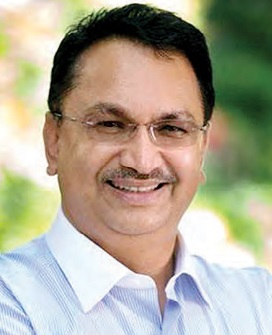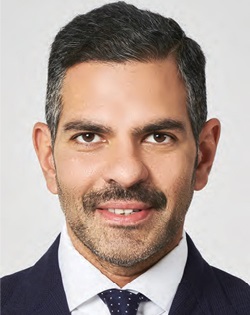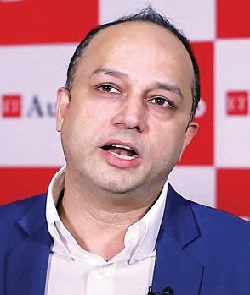The Future of Mobility

The world is looking at the role of mobility to realize a more sustainable development journey. And the future of mobility is being fueled by three key technology-driven disruptive trends: electrification of vehicles, connected & autonomous vehicles and Mobility-as-a-Service. How can consumers and business seize the benefits of this mobility revolution?
To answer this poignant question, CII, at its 2022 Business Summit, conducted the “Future Mobility: Innovating to Drive Sustainability” session, moderated by Vipin Sondhi, Chairman, CII National Committee on Future Mobility and Battery Storage, featuring panelists Vikram Kirloskar, Past President, CII and Vice Chairman, Toyota Kirloskar Motor Private Limited, Sunjay Kapur, Chairman, Sona Comstar Ltd, Salil Gupte, Chairman, CII National Committee on Aerospace and President, Boeing, International, and Sharad Mohan Mishra, President, Group Strategy, TVS.
"The trend is that the fight against climate change is likely to make carbon the currency of the future. It’s going to be a tradable item in the future."
- Vikram Kirloskar,
President, CII
The pace of change as you all of you know has been breathtaking will be breathtaking for the next decade at least and factors such as technology and advancement long-term cost advantages, convenience and most importantly sustainability will redefine the mobility landscape and the objective is to ensure that every country is net zero and not just zero emissions on the tail pipe if i were to enumerate the 10 top mobility trends which even 15 years ago or even 10 years ago we would have, wondered but now are commonly understood, they would be 1) one autonomous. 2) internet of things, 3) electrification including hydrogen powered fuel cells 4) mobility as a service 5) micro mobility bicycles etc 6) artificial intelligence 7) smart infra including smart cities, 8) big data, 9) augmented and virtual reality and 10) 3d printing.
Vipin Sondhi: The mobility industry is strongly backed by strong government policy and support and the government is extremely interested in leading the change and facilitating it the consumers therefore all of us have attractive options from which to choose from. In parallel the government is pushing electric vehicles alternative fuels like CNG and ethanol blending charging infrastructure and of course green hydrogen. I now invite our esteemed panelists to speak.

Vikram Kirloskar: We as a country we are concerned on these three items and recently many geopolitical developments are going to hasten this transaction in this context to my mind there are three mega trends that will shape the futurity the future of mobility the most. The trend is that the fight against climate change is likely to make carbon the currency of the future. It’s going to be a tradable item in the future. I think we’re looking at carbon taxation and we have to look at carbon holistically not just stale pipe emissions, we have to look at the whole ecosystem in the circular economy right from the start of the energy source to the finishing of the energy source, be technology agnostic and do what is best based on the power situation in the country and that’s the that’s the direction I think we have to go in. The second mega trend and that has really come after our experience in covid in using virtual reality and using video conferencing and we are seeing 5g coming in, which will bring in high speed internet and more artificial intelligence. We did a lot of factory work using augmented and virtual reality and this has really reduced the need to travel. It has reduced the need for mobility. So how how will companies deal with this in the future? I’m sure with the airline companies as well that the reduction in need for business travel how are we going to adjust our business as well as mobility in in that direction is something we have to see. The third trend is of course the rapid pace of urbanization and urban congestion. You talked about smart cities, but how do we plan goods and services movement across the country? How do we do more automated transport more reliable in the future is something we have to work on. This is in my mind these are the three most important issues as we go forward.
"I hope that mobility doesn’t reduce especially for our industry and yours. It’s interesting how we have now begun to call the automotive industry the mobility industry"
- Sunjay Kapur,
Chairman, Sona Comstar Ltd
Vipin Sondhi: Sanjay might want to talk about how supply chains are gearing up to be more resilient as OEMs re-look at their business models.

Sanjay Kapur: I hope that mobility doesn’t reduce especially for our industry and yours. It’s interesting how we have now begun to call the automotive industry the mobility industry and when you talk about supply chain and opportunities to supply we’re really opening up a lot of doors for ourselves in the component industry to not just look at automotive alone but mobility as an industry and as a service. A lot of disruption is being seen in our industry. There is a lot of focus on sustainability. You know the prime minister’s net zero carbon emission by 2070 is something that’s driving a lot of change in our industry. Fossil fuels being the single largest import of commodity is a cause of great concern and therefore we are seeing a big push towards electrification.
The two wheeler and the three wheeler industry is growing rapidly when it comes to electrification and that’s something that we’re also seeing a great push from the government in terms of the PLI schemes that have been introduced uh to invest in future technologies. We’re going to see a lot of investment in the component industry in terms of future technologies as well as deep localization. something that’s you know been going on for a while and now it’s only going to accelerate this along this will of course bring a lot of advantages in terms of opportunities.
With the fame 2 scheme and the PLI scheme we’re looking at a large investment or a large opportunity in terms of uh the 54 000 crores that have been announced for the component industry. We are seeing some interesting policies in terms of battery swapping incentives to create a vibrant ecosystem for the startups and we’re seeing a lot of startups come into the auto component industry.
"By 2030 Boeing has a goal of having all of our aircraft to be able to fly on 100 biofuel or sustainable aviation fuel"
- Salil Gupte,
President, Boeing International
Vipin Sondhi: We don’t talk as much about mobility in the air, so Salil, I’d be very happy to hear of your inputs

Salil Gupte: You talked about sustainability of current uh the current stage of aviation and then the future technologies around autonomous and electrification so i’ll actually talk about both of those elements. The first one is the existing state of aviation. India is the third largest aviation market in the world or shortly will be with over 2 400 civil aviation aircraft and cargo aircraft coming into the market over the next 20 years. Now when you talk about that huge growth you have to talk about it from a standpoint of sustainability because right now aviation globally accounts for somewhere between two and three percent of all carbon emissions but in a growth stage like what India is in, we have to make sure that growth is sustainable and so there are several pillars of sustainability that we can pursue. The first of course is more efficient fleets the global airline industry has spent about 1 trillion u.s dollars over the past decade on ensuring that the fleets are of the latest technology. If you go to 1990 the average carbon emission of the fleet today versus 1990 on a per aircraft basis at about 50 percent lower than what it was then. You do see that continuing to evolve so that’s one element of it another element of it is working with the airlines on how they operate the aircraft. The use of sustainable aviation fuel, or biofuels as some call it have to come from the right sources. It has to come from truly waste feedstocks you don’t want to be growing necessarily crops for this purpose for which there’s an opportunity cost to do that but you know there are significant opportunities in the Indian market especially to use waste feedstock uh to fuel aircraft. By 2030 Boeing has a goal of having all of our aircraft to be able to fly on 100 biofuel or sustainable aviation fuel so that’s on the existing aviation side to make sure that growth is sustainable.
"Beyond electric options the two wheeler industry is also working parallelly on alternative fuels as on the flex fuel technology."
- Sharad Mohan Mishra,
President, Group Strategy, TVS

Vipin Sondhi: Sharad, your remarks.
Sharad Mohan Mishra: I think we have one point is very clear that with the visible signs of climate change and and rising environmental concerns there’s no other option but for the future of mobility to be driven by sustainability especially with an economy like ours which is rapidly growing and also urbanizing at very rapid pace. I think that is a one of the biggest concern which we need to address as we are growing. I will speak from a two wheeler’s point of view because this is what I represent right now here. I think it is enabling the transformation in a very critical way. If I divide the issue broadly into three different aspects, one is from the technology shift point of view, the second is on the policy support point of view and the third being the right forms and ecosystem. Looking first at the technology shift and speaking from a two-wheeler point of view the industry has made a significant investment in especially our transition to BS6 emission standard in around April 2020. Both the two-wheeler and three-wheeler market has seen a steady increase in penetration of electric vehicles. I think that’s the fastest moving electric transformation which is happening in the auto industry here right now and in over two years initially it went from being led by some of the good startups and now all the major industry players have announced significant amount of investment and we believe India can continue to lead this too because right now from a two wheeler point of view India is a key leader in electric vehicles across the world. I think this leadership needs to be maintained and I think India can deliver it completely.
Beyond electric options the two wheeler industry is also working parallelly on alternative fuels as on the flex fuel technology. The second aspect of driving sustainable mobilities is that of politics policy from the government. From the policy perspective we have always believed in the market led transition and have therefore requested technology agnostic policy framework to let the market decide the way forward on this topic. Ultimately we believe fight for sustainability is with carbon not with any specific form of transmission alone and I think that will be a very critical aspect as you move forward. This is my belief that while in india we heavily focus on the current form of mobility but i there is a silent revolution which is happening in European markets especially or on some of the industrialized markets in which the micro mobility is in integrating with the larger mobility form in sustainable form in a very accurate way. Infact the carbon footprint of an electric bicycle is one tenth as compared to by electric car and the distance traveled by a bicycle in Switzerland I understand is roughly 25 kilometers per day well by car is around 35 km so people are moving towards it and it is heavily pushed by the urban re-planning. I think this is a great opportunity. This model is also for some of the cities and policymakers from our country too. The last part is the future mobility for all of us here in the ecosystem it is difficult for one player alone to achieve a desired result especially with so much unknown in this topic so integration of ecosystem like getting academia involved in the subject is in the right form in the start as well in the clearly defined business model is the key to success. Collective action will be a must to achieve the result we are looking for.